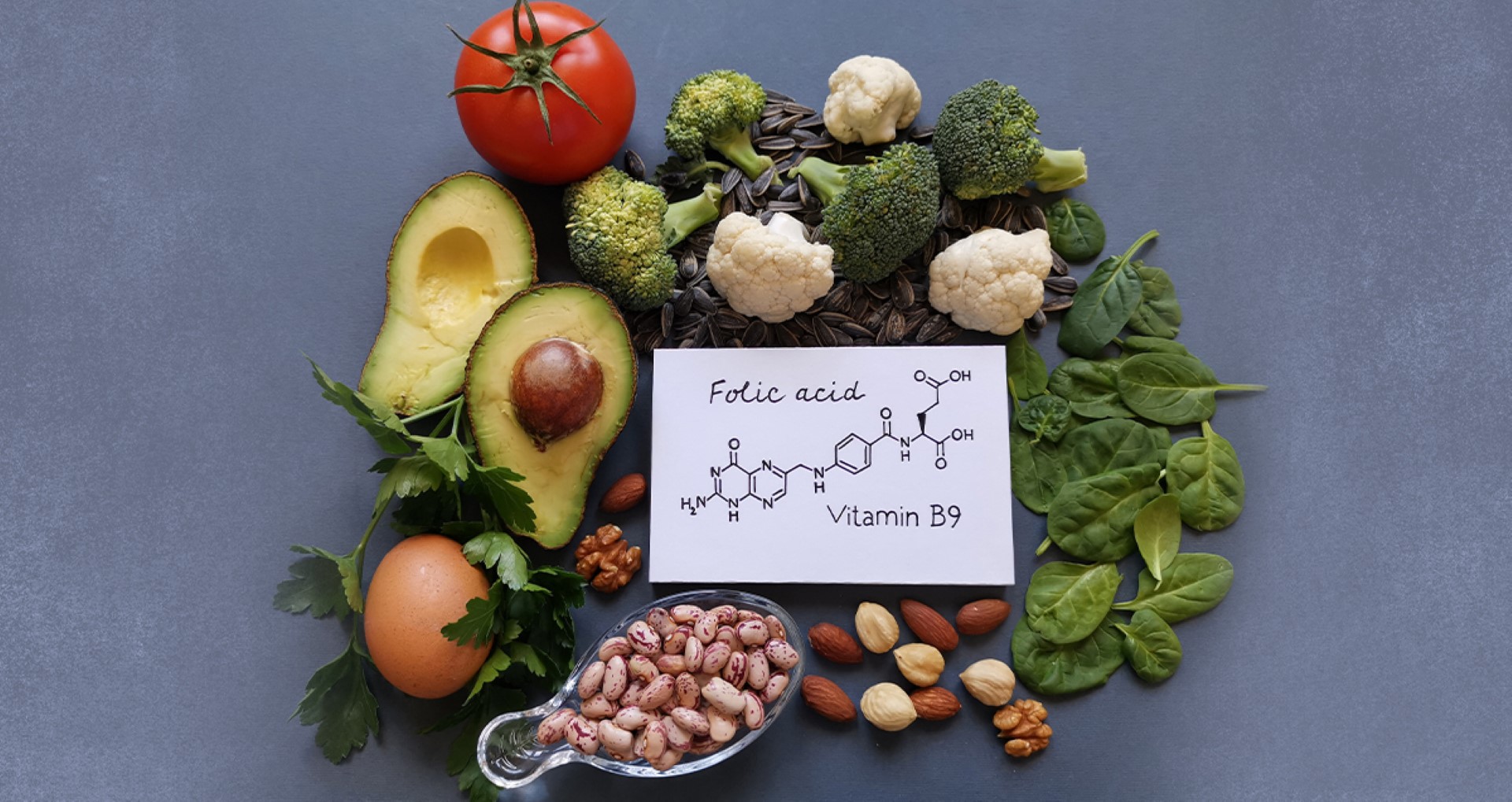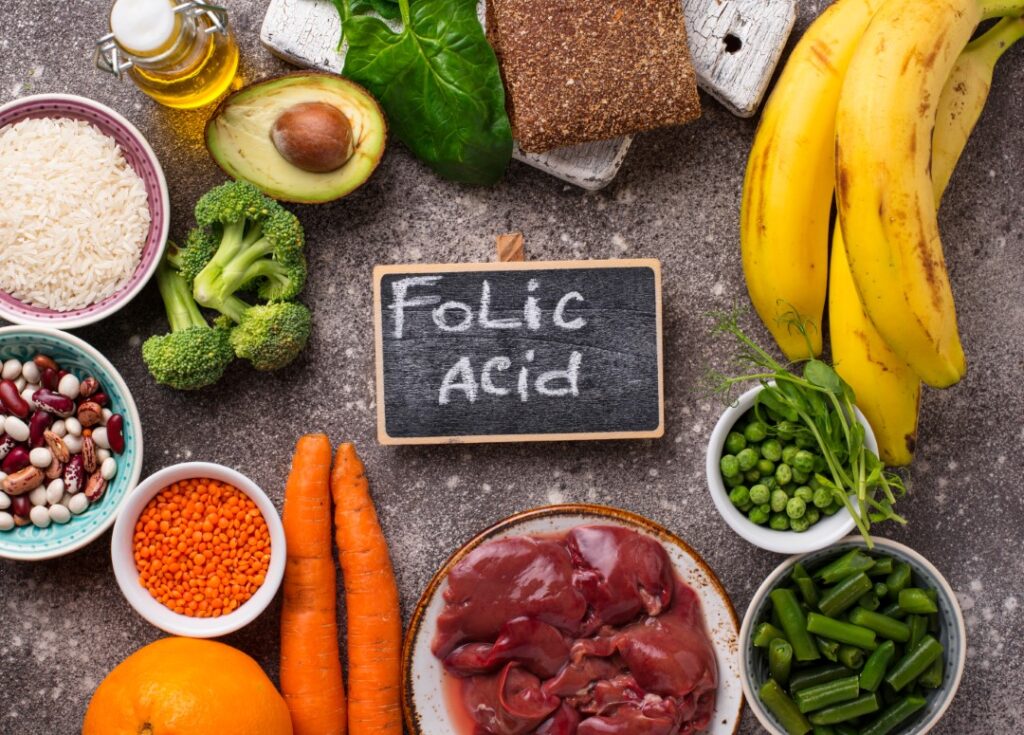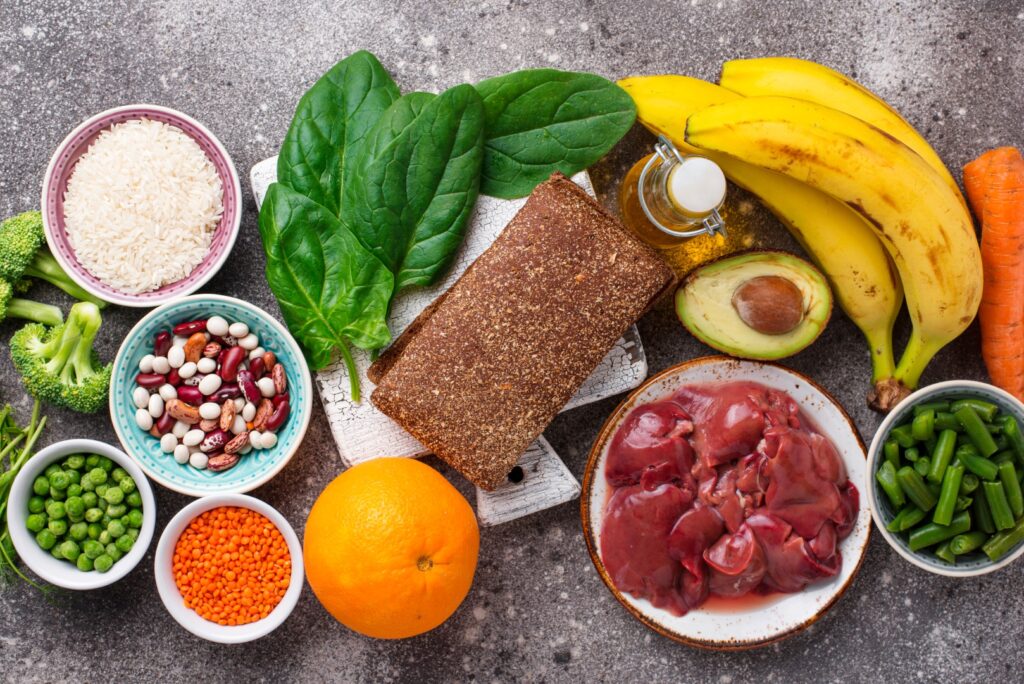
Folic Acid: A guide to the B9 Vitamin
Index
| 1: Introduction |
| 2: Understanding Folic Acid |
| 3: Folic Acid Benefits |
| 4: Folic Acid Foods |
| 5: Folic Acid Deficiency |
| 6: Folic Acid Tablets |
| 7: Folic Acid and Health |
| 8: Recommended Daily Intake |
| 9: How to Incorporate Folic Acid into Your Diet |
| 10: Precautions and Considerations |
| 11: Conclusion |
| 12: FAQs |
Folic acid, also known as folate or vitamin B9, is an essential vitamin for the body’s growth and overall development. It is particularly crucial for pregnant women and lactating mothers since it plays a vital role in DNA synthesis, cell division, and the formation of red blood cells, which are essential for the development of the fetus during pregnancy.
Understanding Folic Acid
Folic acid vitamin that helps build the body and promote its healthy growth. It plays several roles in our body. Some of these roles include:
- Folic acid is essential for DNA Synthesis and is fundamental for cell division. It is particularly important during periods of rapid cell division, such as fetal development and tissue repair.
- Red Blood Cell Formation depends on the abundance of folic acid in the body. (erythropoiesis). A deficiency can lead to megaloblastic anaemia, where undeveloped red blood cells cannot carry oxygen well enough.
- Adequate levels of folic acid are important in pregnant and lactating women as it is essential for the healthy development of the fetal neural tube.
- The process of methylation reactions is facilitated by adequate amounts of folic acid in the body. Methylation is vital for the synthesis of proteins and the maintenance of gene expression.

Folic Acid Benefits
Folic Acid for Prenatal health
It is a commonly known fact that folate is one of the most important vitamins to be included in pregnancy nutrition. Folic acid benefits include:
- Good Neural Tube Development is highly dependent on adequate amounts of folic acid. The neural tube eventually forms the baby’s brain and spinal cord. A deficiency in folic acid can lead to neural tube defects, such as spina bifida.
- In addition to neural tube defects, folic acid has been shown to help prevent other birth defects, such as heart defects and cleft lip and palate.
- During pregnancy, the body is required to produce enough blood cells to support both the mother and the growing fetus. Hence folic acid aids in promoting red blood cell formation which prevents anaemia.
Folic Acid for Mental Health
Various studies show that folic acid provides improvement in mental health and overall growth of the brain as it is vital for the healthy growth of the neural networks of the body.
- Folic acid helps produce feel-good hormones like serotonin, dopamine and fight and flight hormones norepinephrine.
- The process of Methylation is completed with the help of folic acid. Methylation abnormalities have been linked to mental health disorders such as depression and schizophrenia.
Folic Acid for Skin and Hair
Folic acid and antioxidants like Vitamin E are considered to be good for the skin and hair.
- Collagen is a commonly known term in the skin care industry as it is the protein that provides elasticity and structure to the skin. Collagen production is aided by folic acid which helps maintain skin’s firmness and reduces fine lines/wrinkles.
- Folic acid is known to play a role in the body’s wound-healing processes. It helps fasten the process of skin healing and brings the skin back to its original state.
Folic Acid Foods
Folic acid is naturally found in various types of food which range from pulses to meats.
- Leafy Greens like spinach, kale, swiss chard and bok choy are a few sources of folic acid.
- Legumes like chickpeas, black-eyed peas and beans are excellent sources of folic acid.
- Various fruits like oranges, grapefruits, and avocados provide a good amount of folic acid.
- Cereal grains like bread and pasta are fortified with folic acid.
- Vegetables like asparagus, broccoli, beets and brussels sprouts are good sources of folic acid.
- Animal liver like chicken liver is also considered to be high in folic acid.

Folic Acid Deficiency
Folic acid deficiencies often result in visible symptoms like pale skin, fatigue, mouth sores and a general feeling of tiredness. In the case of infants folic acid deficiency appears as developmental/growth issues.
- One of the severe symptoms of folic acid deficiency is Megaloblastic anaemia in which bone marrow produces large red blood cells with low functionality. This results in a decreased ability of the blood to carry oxygen, leading to fatigue, weakness, and pallor.
- When pregnant women experience folic acid deficiency it affects the fetus and its neural tube development. Neural tube development is vital for the healthy growth of the baby’s brain and spine.
- Folic acid is vital for cell division and the synthesis of DNA. In case of a deficiency, cells may not replicate properly, leading to improper growth.
Folic Acid Tablets
Pregnant and lactating women are the highest consumers of folic acid supplementation solely because it is vital in the growth and development of the fetus.
It is recommended to take folic acid when trying to conceive, ideally starting three months before, and continuing during the first 12 weeks of pregnancy. These periods are critical for the fetus’s most vital development.
Folic Acid and Health
Specific health conditions like anaemia often result from a folic acid deficiency. Folic acid is primarily known for its numerous benefits to pregnant and lactating women, which is why the link between folic acid and pregnancy is frequently discussed.
Folic acid plays a crucial role in pregnancy, including the development of the baby’s neural tube, which eventually forms the brain and spinal cord. Adequate folic acid is essential to prevent neural tube defects in the developing fetus.
Neural tube development, production of hormones like serotonin, Methylation process etc. are a few of the things that folic acid aids.
Recommended Daily Intake
The amount of folic acid required is dependent on the life stages of the individual.
1. Pregnant and lactating women: Before Conception:
Women planning to become pregnant are often advised to start taking folic acid supplements at least three months before conception. Post conception they are also required to take it for the first 12 weeks.
2. Young Adults and Middle Age:
Folic acid remains important for overall health in adulthood. Adequate folate intake helps support cell division, DNA synthesis, and the production of red blood cells.
How to Incorporate Folic Acid into Your Diet
Folic acid foods that you can include in your diet:
- Leafy greens like kale, spinach and microgreens
- Legumes like beans, chickpeas and local lentils
- Citrus fruits like oranges, lemons and grapefruits
- Green vegetables and fruits like broccoli, asparagus, avocado
- Fortified grains like bread and pasta
- Sunflower seeds

Precautions and Considerations
Before incorporating folic acid tablets into your health routine, it is important to consult with a healthcare professional who can provide guidance on your needs and offer accurate dosage.
Pregnant women, as well as women planning for pregnancy, should seek advice from a medical professional before beginning folic acid supplementation/consuming folate tablets. Similarly, individuals with preexisting health conditions and those taking medications should look into the potential interactions between folic acid and other medications.
Additionally, individuals who have undergone major surgeries, such as gastric bypass or weight loss surgery, should make sure they receive medical advice regarding supplementation, as absorption may be hindered after such major procedures.
Conclusion
Folic acid is an essential vitamin required for healthy growth and development at all stages of life. It plays a critical role in maintaining the body’s overall well-being. Folic acid is particularly vital during the early weeks of pregnancy, where it aids in neural tube development, DNA synthesis, and helps prevent birth defects.
In addition, folic acid also contributes to improved cardiovascular health, supports a healthy gastrointestinal system, and is also said to improve mental health.
Folic acid benefits can be gained through the maintenance of a well-balanced diet that includes natural sources of folic acid and engaging in regular exercise. In all cases, it is recommended to consult a healthcare professional before incorporating folic acid supplementation into your daily routine.
FAQs
What are the signs and symptoms of folic acid deficiency?
Some signs of a folic acid deficiency include pale skin, fatigue, mouth sores and a general feeling of tiredness.
Is there a difference between natural food sources of folate and synthetic folic acid supplements in terms of effectiveness?
Yes, folic acid supplements are more readily absorbed by the body in comparison to folate found in natural food sources.
Is it safe to give folic acid supplements to children, and if so, at what age should it start?
Folic acid supplementation is generally safe for children, but it is always recommended to consult with a healthcare professional before administering any supplementation into a child’s diet.
How much folic acid do adults need daily, and does it vary for different age groups?
The recommended folic acid dosage can vary based on factors such as age, sex, individual needs, and more. Therefore, it does vary for different age groups.
